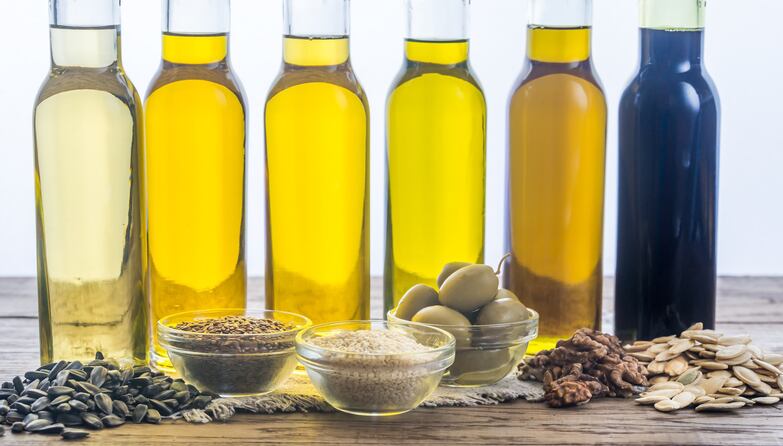Plenish is DuPont’s trademarked soybean oil which has been genetically engineered to have a healthier profile (and longer fry life) than conventional soybean oil.
It has 20% less saturated fat than typical soybean oil and 75% less than palm oil. It has an oleic content of more than 75%, which is similar to olive oil, while its linolenic content of less than 3% - compared to 7% for commodity soy oil – means it has greater oil stability, according to the biotech giant.
But in an open access article available online and published in Scientific Reports of Nature Journal, US researchers suggest its healthy claims may be double-sided.
“We show that while the GM soybean oil Plenish induces less obesity and insulin resistance than conventional soybean oil in mice, it also produces negative effects on liver function, as does olive oil,” said Frances Sladek, a professor of cell biology and toxicology at the University of California, who led the research project.
Coconut oil, which is rich in saturated fats, caused the least amount of weight gain among all the high-fat diets tested.
Co-author Poonamjot Deol said the results could come as a surprise. "In our mouse experiments, olive oil produced essentially identical effects as Plenish - more obesity than coconut oil, although less than conventional soybean oil - and very fatty livers, which was surprising as olive oil is typically considered to be the healthiest of all the vegetable oils.
“Plenish, which has a fatty acid composition similar to olive oil, induced hepatomegaly, or enlarged livers, and liver dysfunction, just like olive oil.”
The findings do not necessarily relate to other soy products like soy sauce, tofu, or soy milk. “[These] are largely from the water-soluble compartment of the soybean; oil, on the other hand, is from the fat-soluble compartment,” said Sladek, although she called for more research to determine the amount of linoleic acid in these product.
The study claims to be the first to compare the long-term metabolic effects of conventional soybean oil to those of Plenish as well as coconut and olive oil.
"We found all three oils raised the cholesterol levels in the liver and blood, dispelling the popular myth that soybean oil reduces cholesterol levels," said Sladek.
Our results also implicate various omega-6 as well as omegas-3 oxylipin metabolites of alpha-linolenic acid and LA in obesity, although it remains to be determined if they act in a causal fashion.”
Soybean oil is comprised of primarily polyunsaturated fatty acids, particularly linoleic acid, an omega-6 fatty acid that makes up around 55% of soybean oil.
The optimum amount of linoleic acid derived from diet is around 1 to 2% but the average US individual has around 8 to 10% linoleic acid because of high levels in soy.
Much less commonly used in Europe than in the US, soybean oil use is nonetheless rising globally. It accounts for more than 60% of all edible vegetable oil used in the US, especially as a home cooking oil and in processed foods.
Importance of a diverse diet

So how should these results be used by the food industry – if it all given that they are based on a mouse study?
Sladek said her findings have led her to change her dietary habits. "One advantage of Plenish is that it generates fewer transfats than conventional soybean oil. But with its effects on the liver, Plenish would still not be my first choice of an oil.”
For Sladek, it’s all about ensuring a diverse diet that incorporates a range of oils.
"I used to use exclusively olive oil in my home, but now I substitute some of it for coconut oil. Of all the oils we have tested thus far, coconut oil produces the fewest negative metabolic effects, even though it consists nearly entirely of saturated fats. Coconut oil does increase cholesterol levels, but no more than conventional soybean oil or Plenish."
However, Sladek noted the limitations of the research; they did not examine the impact on cardiovascular health of coconut oil, for instance.
"As a result, we do not know if the elevated cholesterol coconut oil induces is detrimental. The take-home message is that it is best not to depend on just one oil source. Different dietary oils have far reaching and complex effects on metabolism that require additional investigation."
The researchers received grants from various health institutions as well as the US Department of Agriculture and the United Soybean Board.
They state that while DuPont provided Plenish oil for the study, it played no role in designing the experiments or preparing the manuscript, and had no knowledge of the results prior to publication.
Source: Nature Scientific Reports
“Omega-6 and omega-3 oxylipins are implicated in soybean oil-induced obesity in mice”
Available online 2 October 2017, dx.doi.org/10.1038/s41598-017-12624-9
Authors: Poonamjot Deol, Johannes Fahrmann, Jun Yang, Jane R. Evans, Antonia Rizo, Dmitry Grapov, Michelle Salemi, Kwanjeera Wanichthanarak, Oliver Fiehn et al.
